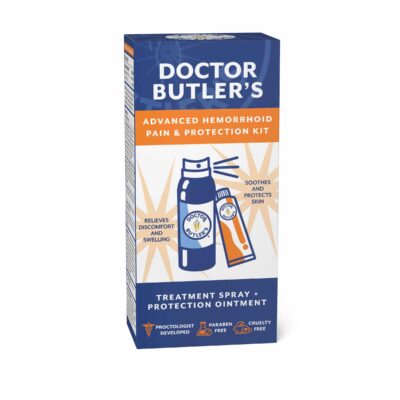They say there’s nothing worse than a paper cut, but imagine a paper cut…in your butt. It may be tiny, but it’s a slice that packs a painful punch, and it’s the perfect way to visualize an anal fissure. Along with hemorrhoids, they’re a main culprit when it comes to irritation, bleeding and discomfort in that most sensitive region. Keep reading to find out more on what causes recurring anal fissures, stages of fissure healing and of course, anal fissure treatment.
Who are we? We’re Doctor Butler’s, experts in down-there care of hemorrhoids and related conditions. We make proctologist-developed hemorrhoid ointments and complementary products to help you quickly leave the pain behind. Everything here is medically reviewed by proctologist Dr. Robert Cutler
“Best Help Ever! This product is better than the prescription my doctor gave. I’m sticking with what works.”
Verified ReviewerWhat Are Anal Fissures?
Anal fissures are fine tears in the lining of the anus or anal canal. They form around the opening through which stool exits the body for a number of different reasons. The majority of fissures are caused by digestive conditions or trauma that put significant strain on the anus. The strain leads the lining to tear, and the ensuing pain can be quite intense as the tears are exacerbated by each use of the anal canal.
If the condition or situation causing the tear persists, the tear will not self-heal and will then become a fissure. In other words, a fissure is a chronic tear. What can cause anal fissures? Are you asking what to do if I have anal fissures? Get those answers now.
Who Is Likely to Get Anal Fissures?
As anal fissures are primarily caused by an increase in pressure on the anus, anyone is potentially at risk for forming the tiny tears. There are a number of conditions that can predispose you to tearing in this region. Risk factors include:
- Age
- Crohn’s disease
- Constipation
- Diarrhea
- Hemorrhoids
- Diet (excessive spicy foods, nuts, seeds, corn, popcorn)
- Pregnancy and Childbirth
- Other coexisting conditions
What Causes Anal Fissures?
Many situations result in anal fissures, and common causes run the gamut from poor digestive health to obesity. Childbirth, too, is considered a traumatic event for the anus, which takes on an enormous amount of added pressure. It can tear as a result. Other trauma filed under anal fissure causes includes inserting foreign objects into the anus, chronic constipation or diarrhea and any sort of straining in order to pass a stool. The common link among these causes is the exertion of unnecessary effort on the part of the anal canal, which can only withstand a certain amount of wear before it will begin to microscopically rip to keep up.
Symptoms of Anal Fissures
Similar to hemorrhoids, anal fissure symptoms can be detected with careful attention to your body before, during and after a bowel movement. If you are experiencing any of the following symptoms, it may be an indication that you have anal fissures:
- Pain during or after bowel movements
- Blood during bowel movements
- A visible tear in the skin around the anus
- Burning or itching
- Issues when urinating
- New onset of small but painful skin tag
As listed above, one symptom anal fissures have in common with hemorrhoids is the appearance of blood as a result of the tear. Anal fissures, however, are distinguished by the extended pain they cause following a bowel movement, sometimes lasting up to two hours post-bathroom use.
Are anal fissures dangerous? Not particularly, but they are mighty uncomfortable, and next up we’ll learn how to heal a fissure fast.
How Do You Treat Anal Fissures?
Once you have self-identified or received a diagnosis of anal fissures, the next steps are twofold. You’ll want to both treat the unpleasant symptoms you are experiencing as a result of the anal fissures, as well as take steps to prevent the conditions that brought them on in the first place.
As far as treatment options, there is medicated anal fissure cream or anal fissure ointment (the difference between cream and ointment has mainly to do with thickness) and surgery. Anal fissures are highly responsive to at-home treatment and changes in diet and routine, so surgery is often considered a last option.
Ointments and Creams
There are a number of at-home techniques recommended for preventing anal fissures. Stool softening measures such as an increase in fluids and dietary fiber or fiber supplements are one effective solution. But those who suffer from chronic anal fissures or are dealing with a fissure that just won’t seem to heal, it may be time to use topical ointments and creams. Those will numb the anus and ease the discomfort of the fissures.
“You want a medicine for inflammation and pain primarily,” says Dr. Cutler, a board certified proctologist and Doctor Butler’s founder. “As a physician I prescribe a mix of hydrocortisone (a steroid), analgesics for pain, and antibiotics to my patients to reduce swelling, especially in open, raw, and irritated tissue. That could be a regimen of Analpram, Bactroban & Lidocaine, for example. But those are prescriptions, and I recommend mostly for advanced cases.”
Dr. Robert Cutler, product developer at Doctor Butler’s
Hemorrhoid and anal fissure medicated creams like the prescription Anusol HC and AnaMantle HCare made with ingredients like Lidocaine and Hydrocortisone to reduce the pain associated with anal fissures. Occasionally, physicians will avoid prescriptions for anal fissures and simply suggest a regimen of Vaseline to protect skin and an OTC witch hazel pad like Tucks.
At Doctor Butler’s, we’ve found that Lidocaine based ointments and creams thread the needle between prescription strength medicine and the ease of an over the counter product. For fissures we recommend you use our Advanced Formula Hemorrhoid & Fissure ointment. If you have fissures and hemorrhoids at the same time then we recommend our original Maximum Strength ointment.
This is because our original ointment, which contains the vasoconstrictor Phenylephrine, should be used to first reduce the swelling of the hemorrhoid. Because of the phenylephrine the ointment should not be put directly on the fissure. Instead, treat the fissure with sitz baths and keep the area clean. After the swelling subsides, the fissure can be treated directly with our Advanced formula.
These ointments will work quickly to soothe the area surrounding the anal fissure and promote a hygienic environment in which healing can occur. The best cream for anal fissures is going to change based on your specific anal fissure symptoms and whether they are coexisting with hemorrhoids. There is more information about our Maximum Strength, Advanced Formula and our basic Lidocaine pain formula here:
- Maximum Strength: Hemorrhoid ointment
- Advanced Formula: Advanced hemorrhoid cream with lidocaine
- Basic Lidocaine Pain Formula: Hemorrhoid cream
Surgery
While surgery used to treat anal fissures is done on an outpatient basis, it is still a last resort as far as treatment is concerned. Any suggestion of surgery should include careful consideration of what has caused alternative treatment options to fail. The surgery involves cutting part of the internal anal sphincter muscle in an attempt to reduce the spasms and pain that are preventing the anal fissures from healing properly.
Anal Fissure Prevention Tips
In addition to ointments, creams and surgery, there are a number of preventative measures you can take on daily. The following tips will both help heal anal fissures and decrease the likelihood that they will reoccur. Working to incorporate these habits gradually is a surefire way to keep your anus strong and sturdy when the pressure’s on.
Fiber-Rich Diet
A fiber-rich diet is recommended for almost all ailments pertaining to the anus, and this is for good reason. A diet high in fiber, or even the use of fiber supplements in tandem with food such as whole grains, fruits and vegetables, helps to ensure the movement of food waste through the intestine with ease. That’s because fiber absorbs water as it moves along for softer stools that pass quickly and without strain.
Staying Hydrated
Dehydration is the culprit behind many of the most tenacious gastric and rectal grievances. When the colon does not have enough access to fluids, it takes that fluid from the stool itself to help process and digest the food waste. That leaves a stool that is hard, dry and uncomfortable to pass. Anal fissures form from this continued strain. Ensure proper hydration throughout the day to lessen this load on the anal lining.
Healthy Bathroom Habits
There are number of tips you can incorporate into a regular bathroom routine to help us fight anal fissure formation. The following list includes suggestions that target the prevention of these conditions:
- Don’t over-wipe or use scented toilet paper.
- Use the bathroom as soon as you feel the urge.
- Prevent straining when using the bathroom.
- Don’t remain seated on the toilet for an extended amount of time.
- Keep the anal area dry and clean at all times.
When to See a Doctor for Anal Fissures
If you’ve identified a potential anal fissure and tried to treat it using ointments, taking proper care of the cut before, during and after bathroom use, and lessening strain on your bowels to little effect, it is time to see a medical professional.
How long does anal fissure last? Anal fissure symptoms such as a ripping sensation or burning after a bowel movement may last up to six weeks. That said, any significant increases in pain or blood as well as failure to improve over 7 days signals the need to seek a doctor at once. The time it takes fissures to heal varies for each individual but is hastened by conditions that encourage the regrowth of the torn lining.
Ease the Pain With Doctor Butler’s Help
With the right treatment for your anal fissures you’ll be on the road to recovery in no time. Once you’ve identified your symptoms as an anal fissure, careful attention in the kitchen, bathroom and bedroom can help encourage healing. Doctor Butler’s is ready when it’s time for that extra boost, offering creams and ointments to help kick the next stage of healing into high gear.

